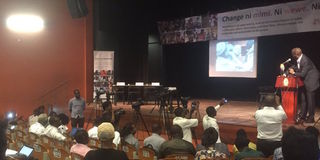Corruption trend in Tanzania declining, new study shows

What you need to know:
- Titled "Untouchable? Tanzanians views and experiences of corruption”, the study bases its findings on data from Sauti za Wananchi, which is a nationally mobile phone survey involving 1,705 respondents across Mainland Tanzania.
Dar es Salaam. Five out of six citizens, which is equivalent to 85 per cent, think corruption has declined in the country than was the case five years ago, a new study by Twaweza shows.
Titled "Untouchable? Tanzanians views and experiences of corruption”, the study bases its findings on data from Sauti za Wananchi, which is a nationally mobile phone survey involving 1,705 respondents across Mainland Tanzania.
Presenting the findings on Wednesday, November 22, Twaweza executive director Aidan Eyakuze said citizens say level of corruption was 85 per cent better compared to 2014 when the level stood at 11 per cent.
"Those who said corruption cannot be reduced at all have gone down to nine per cent this year as compared to 51 per cent who believed so in 2014," he said.
He said six in ten citizens (60 per cent) say corruption was very common in the police than any other institution or sector.
However, he said the percentage was slightly down as compared to 2014 when 89 percentage was recorded.
"Fifty-six per cent of respondents say corruption was very common in the courts and the judiciary, thus standing second after the police," he said.
According to him, corruption has declined from 85 per cent in political parties and electoral processes as recorded in 2014 to 48 per cent in 2017.
He said corruption acts have declined to 35 per cent in land issues as compared to 65 per cent in 2014 and to 26 per cent in taxation services from 70 per cent.
"Corruption is 26 per cent in healthcare services down from 62 per cent in 2014. In education corruption is 10 per cent down from 42 per cent in 2014," he said.
Survey shows that over half of the population, about 56 per cent, knows that corruption issues need to be reported to the Prevention and Combating of Corruption Bureau, some of them mentioning the police and village executive officers.




